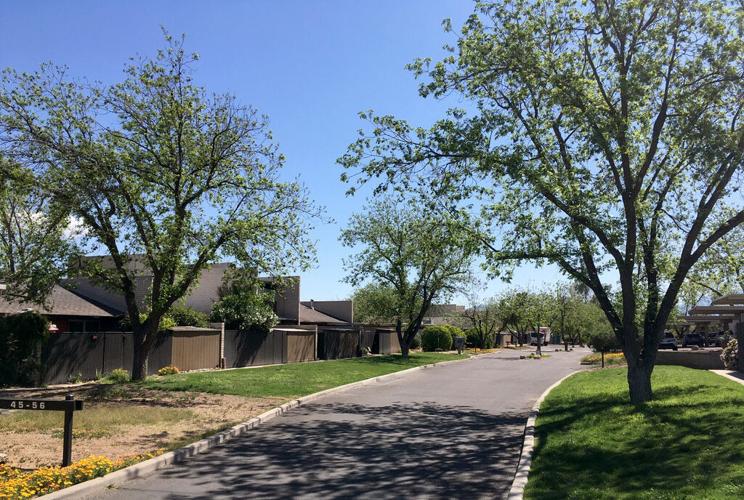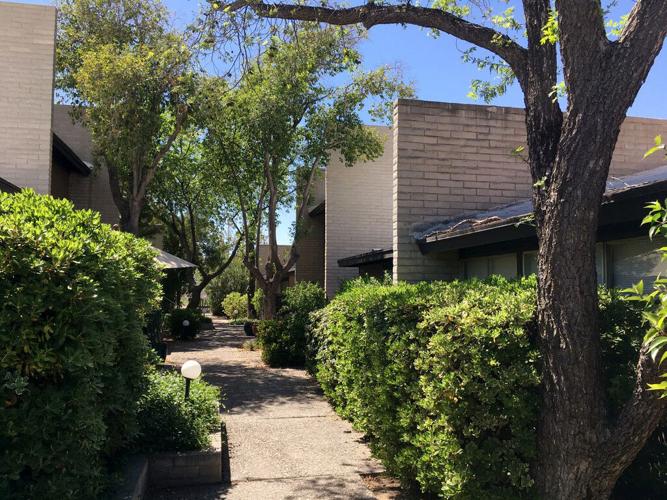A former pecan orchard in Tucson that was developed into a townhome community more than 50 years ago has been listed on the National Register of Historic Places.
Orchard River Garden Park, known as Orchard River Townhomes, is adjacent to Fort Lowell Park, east of Craycroft Road, at 5701 E. Glenn St. It has 34 buildings with 136 homes in one- and two-story units.

The Orchard River Garden Park has 34 buildings with 136 homes in one- and two-story units.
Aside from the modernist architecture, the community was recognized for its garden setting.
Local architect Robert Swaim designed the townhomes and the landscape was designed by Guy Greene, who founded the University of Arizona landscape architecture program.
Swaim chose materials and colors that complemented the desert and preserved much of the pecan orchard that still stands today.
The Orchard River homeowners association voted in April 2018 to pursue the historic listing since the complex, which was built in 1971, would become eligible for the designation upon turning 50, said Linus Kafka, a resident and instructor at the UA School of Architecture who worked on the application process.
“We wanted to bring attention to its architecture and landscape,” he said. “It is a significant property.”

The Orchard River Garden Park community has easy access to the Pima County Loop, east of the complex, and Fort Lowell Park.
The community has about 500 residents.
Inclusion on the national listing means residents will receive a property tax reduction as well as protection of the exterior of the homes from remodeling, which is currently enforced by the HOA.
The neighborhood received a grant from the Cornell University Clarence S. Stein Institute for Urban and Landscape Studies to help obtain historic designation for the townhomes.
“The grant from Cornell University proved that this landmark design wasn’t just a matter of local recognition,” said Chris Evans, a local architect who oversaw the historic application process and helped create the Modern Architecture Preservation Project.
The community has easy access to the Pima County Loop, east of the complex, and Fort Lowell Park.
The city of Tucson has around 40 neighborhoods listed on the National Register, dating back to 1976 when the Armory Park neighborhood, downtown, was first listed.
Photos: Tucson neighborhood has been listed on the National Register of Historic Places
Orchard River Garden Park
Updated
The Orchard River Garden Park, located in the Old Fort Lowell Neighborhood, has been listed on the National Register of Historic Places.
Orchard River Garden Park
Updated
The Orchard River Garden Park, located in the Old Fort Lowell Neighborhood, has been listed on the National Register of Historic Places.
Orchard River Garden Park
Updated
The Orchard River Garden Park, located in the Old Fort Lowell Neighborhood, has been listed on the National Register of Historic Places.
Orchard River Garden Park
Updated
The Orchard River Garden Park, located in the Old Fort Lowell Neighborhood, has been listed on the National Register of Historic Places.
Orchard River Garden Park
Updated
The Orchard River Garden Park, located in the Old Fort Lowell Neighborhood, has been listed on the National Register of Historic Places.
Orchard River Garden Park
Updated
The Orchard River Garden Park, located in the Old Fort Lowell Neighborhood, has been listed on the National Register of Historic Places.
Orchard River Garden Park
Updated
The Orchard River Garden Park, located in the Old Fort Lowell Neighborhood, has been listed on the National Register of Historic Places.
Orchard River Garden Park
Updated
The Orchard River Garden Park, located in the Old Fort Lowell Neighborhood, has been listed on the National Register of Historic Places.
Orchard River Garden Park
Updated
The Orchard River Garden Park, located in the Old Fort Lowell Neighborhood, has been listed on the National Register of Historic Places.
Orchard River Garden Park
Updated
The Orchard River Garden Park, located in the Old Fort Lowell Neighborhood, has been listed on the National Register of Historic Places.
Orchard River Garden Park
Updated
The Orchard River Garden Park, located in the Old Fort Lowell Neighborhood, has been listed on the National Register of Historic Places.
Orchard River Garden Park
Updated
The Orchard River Garden Park, located in the Old Fort Lowell Neighborhood, has been listed on the National Register of Historic Places.







